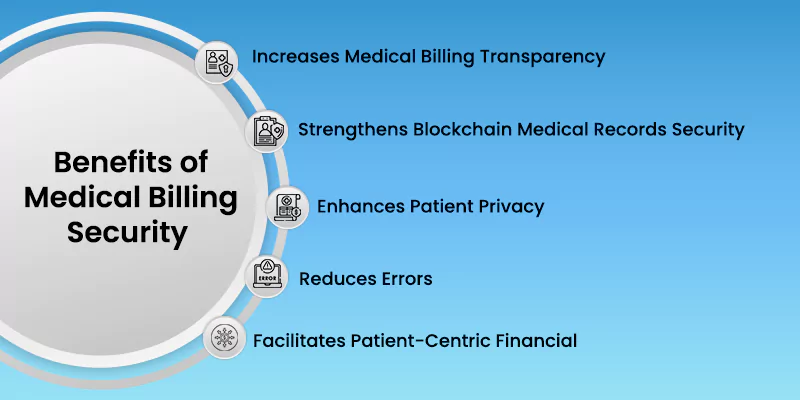
In this blog, MHRCM explains the important aspects of medical billing security. Blockchain technology simplifies documenting transactions in the healthcare industry. Blockchain technology uses cryptographic techniques to establish a safe setting in which every transaction is recorded and connected to its prior version. Blockchain’s secure architecture lowers the possibility of illegal access that has a great impact in medical billing procedures.
Benefits of Medical Billing Security
Improves Billing Experiences
When blockchain technology is efficiently used in healthcare billing, billing code errors, inaccurate claims filings, and other crucial billing issues can be significantly reduced. It means that each transaction is verified and recorded only once. The blockchain’s unchanging ledger reduces potential errors.
Increases Medical Billing Transparency
Transparency plays a crucial role in developing trust between patients, healthcare providers, and insurer providers. Since many patients find unclear medical bill issues, blockchain technology can handle these types of issues. Patients can monitor their medical bills in real time, thanks to this feature. It enhances patient engagement and satisfaction. This helps in building trust among patients and healthcare professionals.

Strengthens Blockchain Medical Records Security
Blockchain’s decentralized structure guarantees that your medical records are safeguarded and integrated. It removes the possibility of unwanted access by storing data over a distributed system of nodes. Every transaction has a cryptographic connection. This feature reduces the possibility of data breaches and boosts stakeholder trust. Blockchain for HIPAA compliance meets regulatory standards and safeguards data. This saves your medical billing from fraud. It ensures the patient records are safe and undamaged and proves efficiency of healthcare data security.
Enhances Patient Privacy
Blockchain provides access to share patient health data safely. Smart contracts and decentralized identity management solutions allow patients to safely manage their consent preferences. The procedure promotes a more open and patient-centered healthcare ecosystem by empowering patients to protect their data privacy in medical billing. This also facilitates easy data sharing for medical treatment, research, and other uses. Blockchain encryption in healthcare allows authorized people to access patient data. Thanks to the medical billing security feature, updates can be decoded only with the right encryption keys.
Reduces Errors
The transparency of blockchain technology helps in preventing fraud and errors in medical transactions. Blockchain lowers the risk of imitation products entering the supply chain by allowing stakeholders to track the movement of assets, including medications and medical devices. This is achieved through an auditable and transparent record of data exchanges. Furthermore, by enforcing business rules, smart contracts can lower the possibility of fraudulent claims and billing issues. It enhances the overall integrity of healthcare medical operations.
Facilitates Patient-Centric Financial Decisions
Blockchain technology enables improved patient outcome tracking as healthcare evolves toward value-based billing. In this case, compensation is based on the quality of the services rather than just the quantity of work completed. This emphasizes how important it is to have reliable billing systems that can precisely record pertinent quality metrics.
By allowing healthcare providers to give transparent pricing based on patient data such as insurance information, blockchains facilitate patient-centric billing.
Challenges of Blockchain Technology
Billing inaccuracies and reimbursement delays are just a few of the billing issues that the healthcare industry faces. These difficulties lead to the rising needs of healthcare. These issues can be addressed and resolved with blockchain technology. With its security features, blockchain mitigates data manipulation by safeguarding the information.
Conclusion
In this blog, MHRCM explains the advantages and disadvantages of blockchain in healthcare. Our team of professionals is dedicated to helping healthcare companies in achieving the complete potential of blockchain technology in healthcare, from strategy to implementation and support. Blockchain plays a major role in exploring medical billing security’s potential.
FAQ
How Does Blockchain Enhance Data Integrity?
Blockchain’s decentralized structure guarantees that your medical records are safeguarded and integrated. It removes the possibility of unwanted access by storing data over a distributed system of nodes.
How does medical billing help in the reduction of errors?
Blockchain helps to regularly monitor the movement of assets. This is achieved through an auditable and transparent record of data exchanges.
What are the benefits of blockchain?
Blockchain helps to improve billing experience and transparency, enhance data integrity, patient privacy, and detect errors.
About the Author





